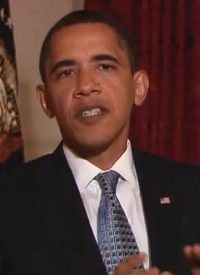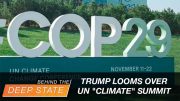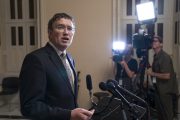
On August 3, everyone in the White House press corps was pretending President Obama hadn’t already broken his campaign promise not to back tax increases upon the middle class. The whole White House press corps was agog with speculation over comments by Obama’s top two financial appointees on Sunday-morning talk shows that broad tax increases are on the horizon for the middle class.
Treasury Secretary Timothy Geithner and Chairman of the Council of Economic Advisors Lawrence Summers both said that the Obama administration would have to do “what is necessary” to bring the federal deficit under control.
{modulepos inner_text_ad}
Of course, Obama had long ago broken his campaign promise not to raise “any of your taxes” to the lower 95 percent of income earners. Obama signed the Children’s Health Care legislation on February 4 that doubled the federal tax on tobacco, and has pushed an $840 billion tax increase in the form of American Clean Energy and Security Act of 2009 that is currently working its way through Congress. But the normally passive White House press corps smelled a story, one where Obama is testing the waters for an income tax increase.
White House Press Secretary Robert Gibbs tried to quell the August 3 discussion of an upcoming Obama tax increase by stating that “the President has made a very clear commitment to not raise taxes on middle-class families, period.” The press corps wasn’t buying it, though they were subservient enough not to mention the past instances where Obama’s tax promises were ignored. Jake Tapper from ABC News replied: “But if economists, including the President’s own economists, don’t necessarily think that it’s possible to do so without raising taxes on the middle class, how is that dealing candidly with the American people?”
With trillion-dollar annual deficits on the foreseeable horizon, it was a good question. The federal government is going to have to either cut spending or increase taxes. There’s no other way to cut the deficit down to size. Gibbs gave a rambling reply that not only didn’t answer the question about how the Obama administration would cut the deficit, but actually included vague remarks about “some decisions down the road on some of the President’s legislative priorities” that appeared to confirm Geithner and Summers’ remarks about tax increases:
Well, again, Jake, there are a series of things that have to be done. I think you’ll actually hear an announcement from Treasury later this afternoon about how much money has to be borrowed versus what they thought was going to have to be borrowed and what will have to be borrowed as a result of financial stabilization.
In terms of cutting the amount of money that’s needed, again, I think the President has been clear on this. The first thing that we can do — the most important thing that we can do right now is get our economy growing again. We know that the deficit — part of the reason that the deficit is up right now is that the economy has slowed down so much that tax revenues — because it’s what happens in an economic slowdown — have regressed a lot. I think the President — obviously we’re going to have to make some decisions down the road on some of the President’s legislative priorities and some of the things that Congress wants to do to evaluate how we move back towards — on a path toward fiscal sustainability.
What followed was a series of back-and-forths where reporters tried to get Gibbs to rule out tax increases entirely, and all Gibbs would do is reiterate the president’s already broken promise:
Q So did Geithner and Summers go off script or were they sort of testing the temperature out there of what something like this would —
MR. GIBBS: I don’t know. I know the President has been clear about his commitment on it.
Q So there is no — there’s no real scenario there, as the administration sees it, where middle-class taxpayers might be hit with a hike? There’s no scenario right now —
MR. GIBBS: The President has been clear, very clear.
Q Could I make that even a little more precise? The President, as you well know, is — not just middle class, but he’s been very precise about it: no family —
MR. GIBBS: Let me be precise.
Q Go ahead.
MR. GIBBS: Let me be precise: The President’s clear commitment is not to raise taxes on those making less than $250,000 a year.
Q So any implication anybody drew from Geithner and Summers yesterday to the contrary is flatly wrong?
MR. GIBBS: I think the President has been clear. I think you heard him reiterate it not that long ago right outside this room in the Rose Garden.
Q But you can understand why people took what they said yesterday as Geithner and Summers trying to open the door a little bit?
MR. GIBBS: Well, I hope you’ll take my reiteration of his clear commitment as an update.
Q So they were not — the door is closed? They did not open the door at all?
MR. GIBBS: I am reiterating the President’s clear commitment in the clearest terms possible, that he’s not raising taxes on those who make less than $250,000 a year.
Q Did he speak to them about the fact that they did raise this little bit of a —
MR. GIBBS: We talked about a number of economic issues this morning in the Oval Office as part of the daily briefing.
Q So is everybody going to be on message now, that absolutely no tax cuts [sic] for families —
MR. GIBBS: Promising that everybody is going to be on message may be a bar that’s too high for me to leap over.
Q But that’s the goal — everybody is on —
MR. GIBBS: The goal is to get the economy moving again. The goal is to get our government back on —
Q Without any tax cut [sic] for any family making less than $250,000 —
MR. GIBBS: Our goal is to get our government back on a path toward fiscal sustainability; to lay the long-term foundation for economic growth. And let’s also — one point that I forget that I think is important in this: Within the very first month of the President taking office, 95 percent of Americans received a tax cut. That’s everybody in the middle class.
The President ran because for eight long years the middle class had borne the brunt of bad economic policies. Even when jobs were being created, even when you saw positive economic growth, for the very first time in our history you actually saw wages for the middle class decline. That’s one of the reasons that led the President of the United States to want to run for President of the United States: to protect the middle class, to cut their taxes — which he did — and to make sure that their voices were heard in the economic policymaking of this country.
Q The door is not open even a millimeter on raising taxes?
MR. GIBBS: I hope you’ll take seriously what I said….
Q But that’s not completely shutting the door. You can say I’m committed to doing something, but you may not do it.
MR. GIBBS: Fine. Ignore everything I’ve said in the last 45 minutes…. If you don’t trust what I’m going to tell you, then I don’t know why we do this.
It’s not surprising that the press corps didn’t trust Gibbs, as he was only reiterating a broken promise in the stale language of that broken promise. But Treasury Secretary Timothy Geithner was much more forthcoming with ABC’s George Stephanopoulos on the August 2 This Week program. Stephanopoulos noted that “former deputy Treasury Secretary Roger Altman said it is no longer a matter of whether tax revenues should increase but how. Is he right?” Geithner replied without hesitation, “George it is absolutely right and very important for everyone to understand we will not get this economy back on track, recovery will not be strong enough to sustain unless we can convince the American people that we’re going to have the will to bring these deficits down once recovery is firmly established.” Pressed on the tax issue by Stephanopoulos, who asked “But you’re not ruling it out, you can’t rule it out?” Geithner replied, “I think what the country needs to do is understand we’re going to have to do what it takes, we’re going to do what’s necessary.”
Lawrence Summers had said much the same thing on CBS’ Face the Nation, telling Bob Schieffer about tax increases for middle-income Americans, “There’s a lot — oh, there’s a lot that can happen over time. But the priority right now, and so it’s never a good idea to absolutely rule things — rule things out no matter what.”
So why did Geithner and Summers go out on the Sunday talk shows and tell the nation that the Obama administration was open to middle-class tax increases, and that they might be “necessary” in the future?
What’s unlikely is that both Geithner and Summers went on the talk shows to spout off their personal opinions and that those personal opinions happened to coincide with identical language about doing “what is necessary” to bring the deficit under control with middle-class tax increases. Cabinet-level contacts with the press are highly coached, and it’s not credible that they weren’t coached on Obama administration tax policy before their appearances.
The likely political purpose behind the tax increase talk by Summers and Geithner was to telegraph to congressional Democrats that Obama would accept a massive tax increase as a “deficit” control measure under one condition: the tax increase would have to appear to be “forced” upon him. Obama would accept it reluctantly in public, only as a pragmatic last resort. This is precisely what happened to the first President Bush’s campaign pledge to “read my lips, no new taxes” as he signed a massive tax increase for all Americans.



